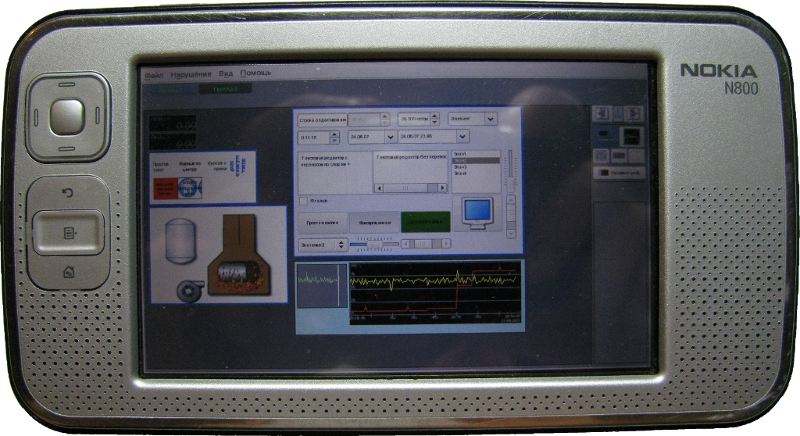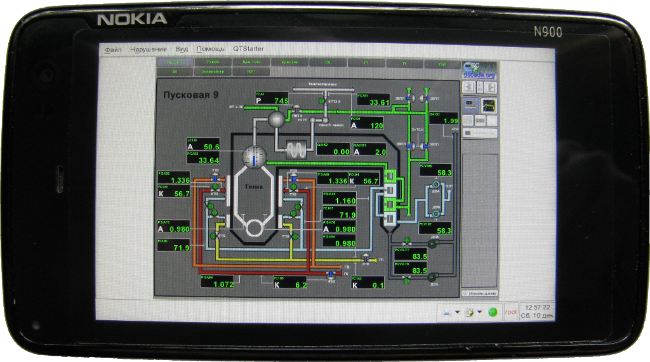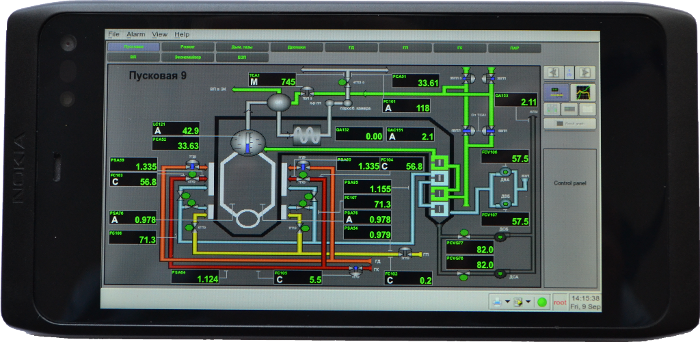|
||||||
|
|
Name: NokiaLinux Start: december 2010 Performers: Roman Savochenko, Maxim Lysenko Description: The project is dedicated to building the OpenSCADA project for the mobile devices of the Nokia company (N800, N900, N950) on the Linux platforms Maemo and MeeGo. Materials: ftp://ftp.oscada.org/OpenSCADA/Devices/Nokia The Nokia company is one of the global leaders in the manufacture and sale of mobile phones. In 2005 the Nokia company has released a pocket-sized personal digital assistant (PDA) N770 on the basis of the full-blown Linux environment with their own desktop environment (based on the GTK +) - Hildon with the title of the project - Maemo. Subsequently, based on the Maemo platform three more mobile devices were produced, namely, two PDAs, "Internet Tablets» N800, N810, and smart phone, "Internet Tablet" N900. In 2010 the Nokia company teamed up to work on Maemo with the MobLin project of the Intel company, thus creating the WikiPedia:MeeGo project. Based on the MeeGo platform in 2011 two smartphones N950(prototype) and N9 were released. For the OpenSCADA project the mobile devices of the Nokia company on the Maemo and MeeGo platforms are interesting in terms of their full-blown OS Linux environment, and the lack of restrictions and blocks on the expansions of these platforms by building and adapting the typical OS Linux programs, which allows easy to adapt the OpenSCADA to the ARM hardware platform and to build the project for these mobile devices of the Nokia company. Adaptation of the OpenSCADA project to run on the ARM hardware platforms was made in 2011 in accordance with the general plan of development wiki.oscada.org/HomePageEn/Works/RoadMap in the N800 environment (wiki.oscada.org/Works/Tests/ARM). Much of adaptation was made in the chroot environment of the ALTLinux distribution, as more recent and less problematic. The latest builds of the OpenSCADA correctly operate in the native environment of the N800. N800 (Maemo 4.1)N800 PDA (fig.1) contains the OMAP2420 processor, with an operating frequency of 400 MHz, touch (resistive) 4.1 "800×480" and is based on the Maemo 4.1 software platform.
At the stage of exploring the possibility of building the OpenSCADA on the N800 some problems of obsolescence of software environment and a number of problems in the performance of the built OpenSCADA were found, part of which was associated with unwillingness the OpenSCADA to work on the ARM architecture. For this reason, the build of OpenSCADA in "chroot" environment of the
To safely make the experiments with the device and prevent possible damage of the original software environment it was adjusted the multi-boot with the ability to boot from the original software environment on the internal flash-drive and from the experimental environment on the internal SD-card, a copy of the original software environment ( To create the "chroot" of the ARM environment of ALTLinux repository the manual Subsequently, to build the OpenSCADA with GUI for the native environment, which became possible with the appearance of the QT4 packages, the official SDK and compile environment of the Nokia company was installed. Installation was made by the installation script of the building environment Attention! In the extended Maemo 4.1 repository, the latest version of QT4 (libqtcore4, libqtgui4-4.5.3-1maemo1) contains an error which leads to the crash of the applications at the time of the creation/deletion of widgets that can be observed in the OpenSCADA configurator on the QT library. To circumvent this problem, it is necessary to install and fix from the updating the previous version of QT4 (libqtcore4, libqtgui4-4.5.2-1maemo2), which does not have this problem and is stable. In addition to the primary purpose of building and running OpenSCADA on this device the following tasks were also made:
N900 (Maemo 5)Nokia N900 contains the ARM processor Cortex-A8 OMAP3430 (600 MHz), touch (resistive) display 3.5 "848 × 480 and is based on Maemo 5 software platform.
To build the OpenSCADA for the native environment an official SDK and compile environment of Nokia company was installed. Installation was made by the building environment installation script N950, N9 (MeeGo 1.2 Harmattan)Nokia N950 contains the ARM processor Cortex-A8 OMAP3630 (1 GHz), touch (capacitive) display 4 "854 × 480 and is based on the MeeGo 1.2 Harmattan software platform. The phone was received from Nokia within the
To build the OpenSCADA for the native environment an official SDK and compile environment of Nokia company was installed. Installation was made using the installation script
|
|||||
UKRAINE, Kamjanske 2004-2006, 2006-2025 Mastering by Roman Savochenko (roman at oscada.org). Powered by CMS TYPO3. |
||||||




